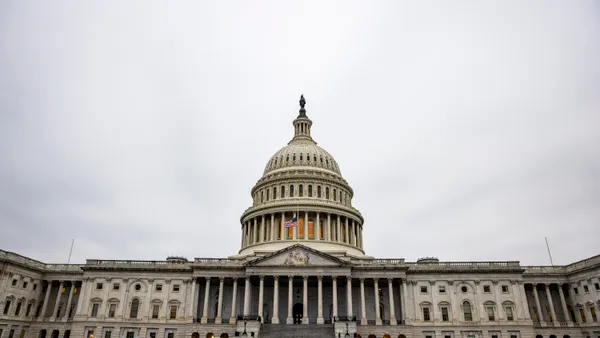The recent developments in the US vaccination mandate for companies have introduced a tremendous challenge for banks and their operations – on top of the exponential increase in complexity that companies are already dealing with. While organizations understand the need to collect vaccination and test records, most are overlooking the need to equip front-line operations managers with timely information about who can and cannot work from the office.
The vaccine mandate and the impact on return-to-office plans
On September 9, President Biden announced that the Occupational Safety and Health Administration (OSHA) was developing a rule that will impose new directives on employers with 100 or more employees to reduce the spread of COVID and its latest variants. This would require all employees to provide proof they are fully vaccinated or produce a weekly negative test result before coming to work. Companies that match the criteria, including all banks, financial institutions and insurance companies, would risk steep fines from $70,000 to $700,000 for repeated violations.
However, on November 17, OSHA suspended the activities related to the implementation and enforcement of the mandate after a federal court blocked the measure. This has left organizations uncertain of what they will be required to do by law. But, as we'll discuss in this article, mere compliance with a mandate – whether from the federal, state or local government – won't solve all the challenges that mandatory vaccinations and testing bring.
Not surprisingly, before the mandate announcement, companies cautiously encouraged employees to return to the office and get vaccinated but avoided making it compulsory for fear of backlash. In the past few months however, in a bid to get employees to return to the office while ensuring safety precautions, more organizations, including the largest banks, have mandated proof of vaccinations and other rules for those working from the office.
When we consider this, the fate of the Biden administration's mandate becomes somewhat less important. Although companies would no doubt have preferred that the government was the one enforcing the mandate, it's plain that most large organizations are already considering their own mandates or have to comply instead with local regulations.
Even so, many banks had to go back on their return-to-work plans, with some having to delay launch several times, as the delta variant of COVID ripped through the United States. This is reflected in the latest West Monroe quarterly leaders' poll - only 40% reported that their new hybrid work plans were fully operational, compared to 67% that were expecting to have them in place by now according to the Q2 data. It will remain to be seen if the 33% of companies who expect to implement hybrid working by the end of 2021, can do so.
Interestingly, though recent findings from the CED (Committee for Economic Development of The Conference Board) survey show that nearly two-thirds of executives support the administration's mandate – perhaps as it takes the decision out of their hands - 56% of business leaders in the same survey said that they will find it difficult to implement the vaccine-or-test requirement. Crucially, this may speak not just to the challenge of having to demonstrate compliance to the authorities, but the challenges that this brings to each level of the business and the impact on managing the day-to-day work and resources. Even if the administration's mandate does not get passed and companies who do implement their own mandate are subject to no scrutiny, the challenges to day-to-day management will remain.
Employers need to act quickly or risk significant disruption to operations, or – more significantly – putting employees in risky situations with privacy or health concerns.
Don't let eligibility data disrupt your operations
As expected, companies will first determine new policies or update old ones to reflect a mandate. This won't come free of challenges, especially for HR leaders who will have to implement the new policies and communicate with employees who will likely raise privacy concerns, amongst other things. Companies will need to implement new processes and find an efficient and safe way of gathering the information and proof from employees, safeguarding their privacy and ensuring fairness for their jobs in the future. In addition to working closely with the employees, the CEO, HR, IT and operations leaders will all need to be ready to rapidly deploy to meet the mandate, while ensuring no disruption to the daily operations.
The role of operations leaders is crucial in this activity. Beyond the financial repercussions and prioritizing employee safety and privacy, companies need to ensure that a vaccine mandate will not bring further disruptions to the business. Companies shouldn't forget that the data they gather to enforce their mandate is powerful and can make or break operations depending on whether it is put in the hands of the managers that ensure the smooth running of all functions.
This is perhaps why the employees most impacted by a mandate are the middle managers in operations. After all, they are the ones who must forecast and plan to ensure the right resources are being deployed for the work that needs to be done every day. Managers need to know who is eligible to work in the office and who must work remotely – but they don't need access to the details of that eligibility. Providing that precise balance of information is essential for effectively planning resources, ensuring the right people are deployed on the right projects and for remaining compliant with a mandate.
So how can Banks go beyond compliance and support managers without disrupting operations?
The complexity a mandate adds to the manager's role doesn't just come from the need to manage this data in the business efficiently, but from making this available to managers alongside other operations data to enable them to make timely decisions about their workforce and answer a new question: who is eligible to safely work and from which locations?
Companies may not have realized before the pandemic, but their operational situational awareness was built around having people in offices where supervisors and leaders could see and get a pulse of what was going on. Having to go remote changed that; one of our customers vividly described it as: "like having a paper bag put on your head! Suddenly you have really lost any sense of perspective..."
Banks will need to make eligibility information available to managers in real time, alongside other data such as wellbeing and performance insights. And they will have to make this available in an efficient way and avoid adding more effort to the manager's job which has already become more and more complex in the past two years.
As companies are starting to understand, implementing a hybrid model has been even more challenging than going fully remote as the pandemic hit. Having access to real-time operational and workforce data is critical to effectively redefine, implement new working practices, and manage the workforce wherever they work.
Going beyond compliance
Understandably, in the short term, the focus for organizations will be compliance. But it is important to go beyond simple compliance and keeping the workforce safe, by operationalizing the data. This will enable managers to make informed decisions about the day-to-day availability of resources and work inventory, so they feel in control and are confident their employees feel safe, fairly treated and supported throughout this new way of working.
How is your company dealing with this new challenge? How are you ensuring that this won't disrupt the business and add more unnecessary effort to your managers?
Want to know more?
Whether your organization already has a policy in place or looking for a solution to manage the mandates without disrupting your operations, we'd love to help. To find out more visit the ActiveOps website.










